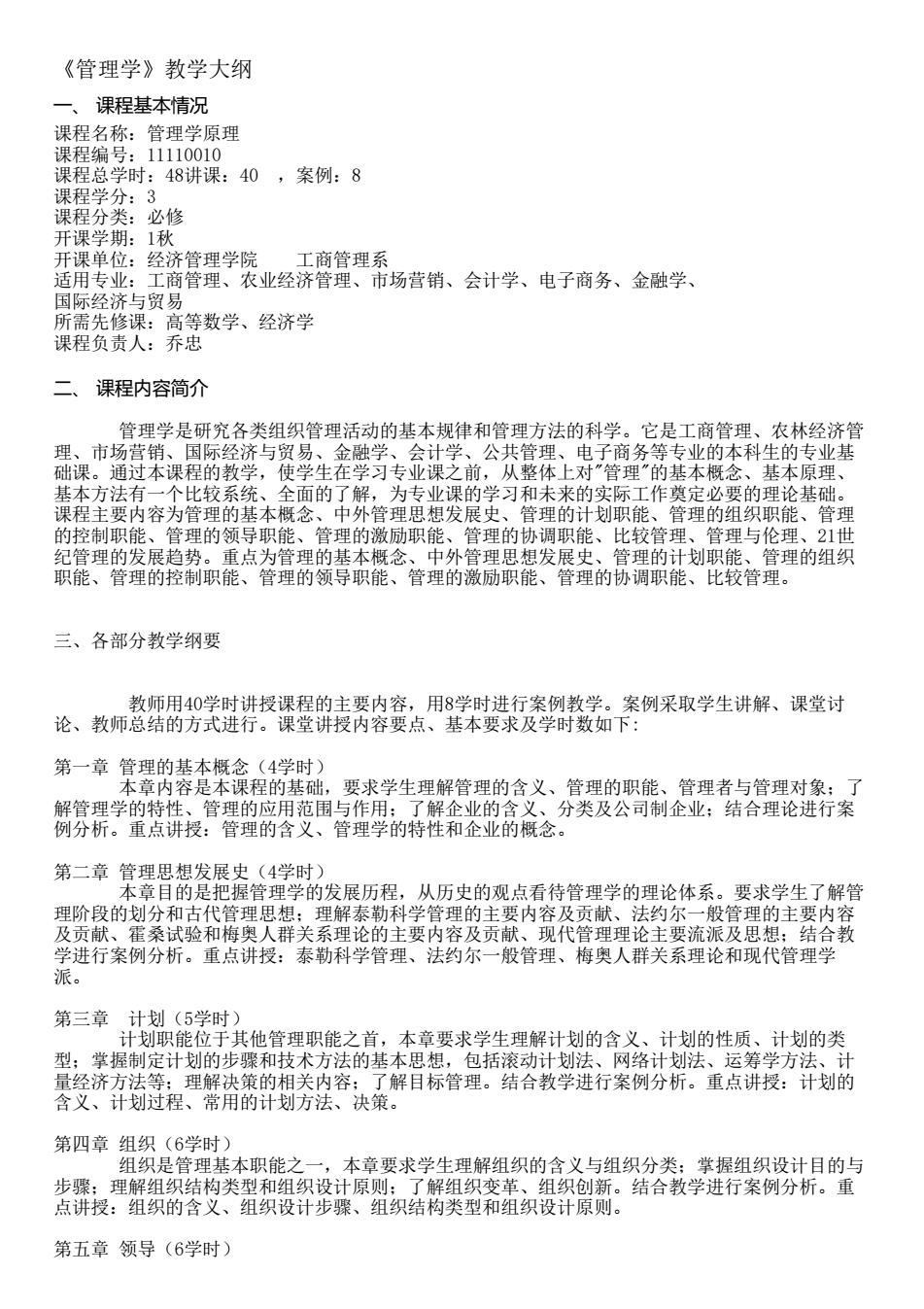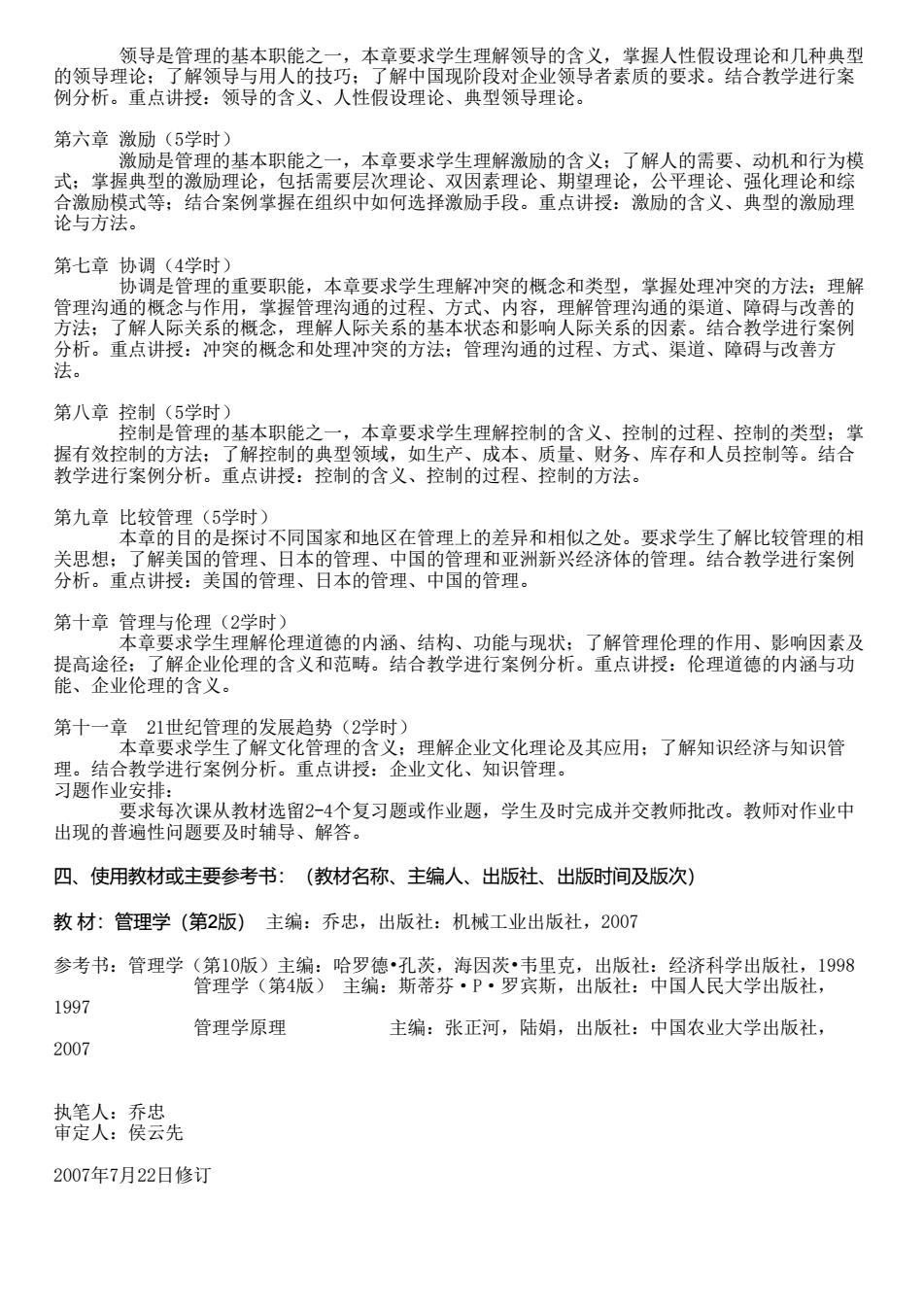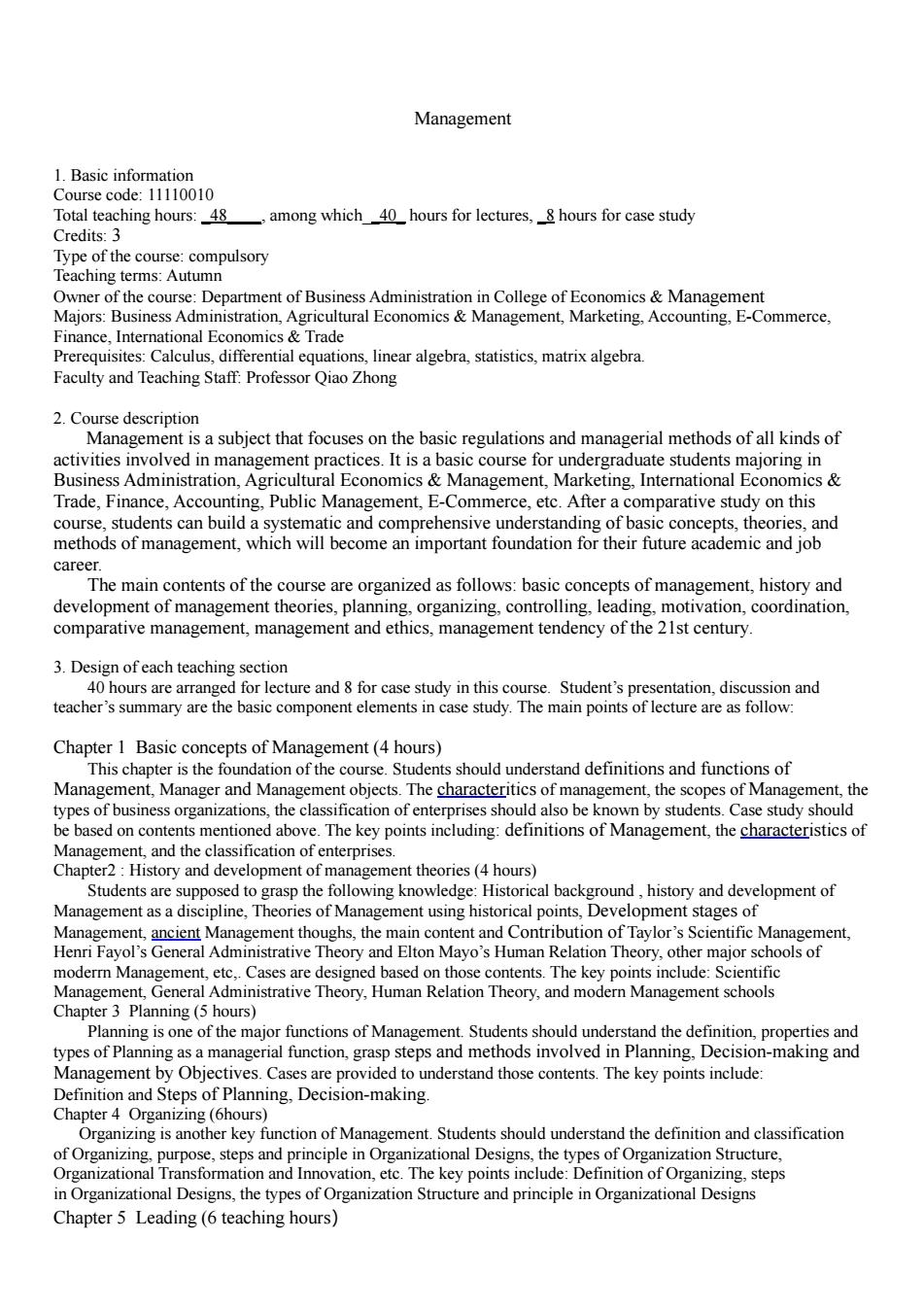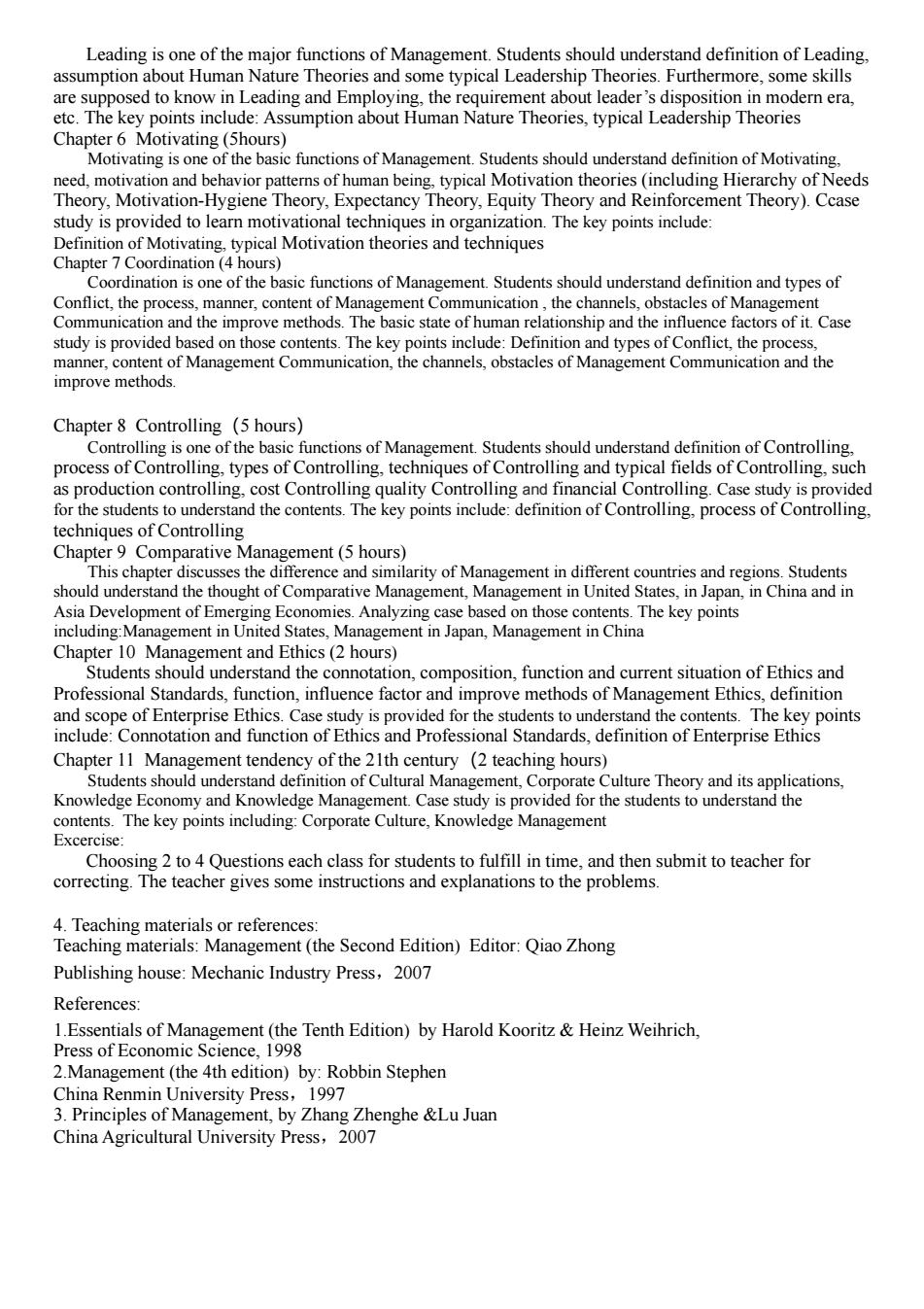
《管理学》教学大纲 一里提甚木情况 课程名称:管理学原理 课程芬类:必修 开课学期:1秋 开课单位:经济管理学院 丁商管理系 适用专业:工商管理、农业经济管理、市场营销、会计学、电子商务、金融学、 国际经济与贸易 所需先修课:高等数学、经济学 课程负责人:乔忠 二、课程内容简介 它是工商管理 一小之益大牙著歌 太课程的 与 学生在学专亚课艺前 业基 而的金子习 业课的 管理的组织职能、 的控制职能、管理的领导职能、管理的激励职能、管理的协调职能、比较管理、管理与伦理、1世 纪管理的发展趋势。重点为管理的基本概念、中外管理思想发展史、管理的计划职能、管理的组织 职能、管理的控制职能、管理的领导职能、管理的激励职能、管理的协调职能、比较管理。 三、各部分教学纲要 教师用40学时讲授课程的主要内容,用8学时进行案例教学。案例采取学生讲解、课堂讨 论、教师总结的方式进行。课堂讲授内容要点、基本要求及学时数如下: 第一章管理的基本概念(4学时) 本章内容是本课程的基础,要求学生理解管理的含义、管理的职能、管理者与管理对象:了 例分析。里讲管理的含变、埋学的特性和炎的念 解管理学的特 管理的应用范围与作 用: 类及公司制企业:结合理论进行案 第二章管理思想发展史(4学时) 本章目的是把握管理学的发展历程,从历史的观点看待管理学的理论体系。要求学生了解管 理阶段的划分和古代管理思想:理解泰勒科学管理的主要内容及贡献、 法约尔一般管理的主要内 及贡献、霍桑试验和梅奥人群关系理论的主要内容及贡献、现代管理理论主要流派及思想:结合教 学进行案例分析。重点讲授:泰勤利学管理、法约尔一般管理、格奥人群关系理论和现代管理学 派。 第三章 3子的 其他管理职能之首 本章要求学生理解计划的含 法的基本思相 计划的性质 包括滚 理解决策的为 解目标管 滚列封学进行案例分法、运筹学方花划的 第四章组织(6学时) 组织是管理基本职能之 ,本章要求学生理解组织的含义与组织分类:掌握组织设计目的与 步骤:理解 组织创新。结合教学进行案例分析。重 第五章领导(6学时)
《管理学》教学大纲 一、 课程基本情况 课程名称:管理学原理 课程编号:11110010 课程总学时:48讲课:40 ,案例:8 课程学分:3 课程分类:必修 开课学期:1秋 开课单位:经济管理学院 工商管理系 适用专业:工商管理、农业经济管理、市场营销、会计学、电子商务、金融学、 国际经济与贸易 所需先修课:高等数学、经济学 课程负责人:乔忠 二、 课程内容简介 管理学是研究各类组织管理活动的基本规律和管理方法的科学。它是工商管理、农林经济管 理、市场营销、国际经济与贸易、金融学、会计学、公共管理、电子商务等专业的本科生的专业基 础课。通过本课程的教学,使学生在学习专业课之前,从整体上对"管理"的基本概念、基本原理、 基本方法有一个比较系统、全面的了解,为专业课的学习和未来的实际工作奠定必要的理论基础。 课程主要内容为管理的基本概念、中外管理思想发展史、管理的计划职能、管理的组织职能、管理 的控制职能、管理的领导职能、管理的激励职能、管理的协调职能、比较管理、管理与伦理、21世 纪管理的发展趋势。重点为管理的基本概念、中外管理思想发展史、管理的计划职能、管理的组织 职能、管理的控制职能、管理的领导职能、管理的激励职能、管理的协调职能、比较管理。 三、各部分教学纲要 教师用40学时讲授课程的主要内容,用8学时进行案例教学。案例采取学生讲解、课堂讨 论、教师总结的方式进行。课堂讲授内容要点、基本要求及学时数如下: 第一章 管理的基本概念(4学时) 本章内容是本课程的基础,要求学生理解管理的含义、管理的职能、管理者与管理对象;了 解管理学的特性、管理的应用范围与作用;了解企业的含义、分类及公司制企业;结合理论进行案 例分析。重点讲授:管理的含义、管理学的特性和企业的概念。 第二章 管理思想发展史(4学时) 本章目的是把握管理学的发展历程,从历史的观点看待管理学的理论体系。要求学生了解管 理阶段的划分和古代管理思想;理解泰勒科学管理的主要内容及贡献、法约尔一般管理的主要内容 及贡献、霍桑试验和梅奥人群关系理论的主要内容及贡献、现代管理理论主要流派及思想;结合教 学进行案例分析。重点讲授:泰勒科学管理、法约尔一般管理、梅奥人群关系理论和现代管理学 派。 第三章 计划(5学时) 计划职能位于其他管理职能之首,本章要求学生理解计划的含义、计划的性质、计划的类 型;掌握制定计划的步骤和技术方法的基本思想,包括滚动计划法、网络计划法、运筹学方法、计 量经济方法等;理解决策的相关内容;了解目标管理。结合教学进行案例分析。重点讲授:计划的 含义、计划过程、常用的计划方法、决策。 第四章 组织(6学时) 组织是管理基本职能之一,本章要求学生理解组织的含义与组织分类;掌握组织设计目的与 步骤;理解组织结构类型和组织设计原则;了解组织变革、组织创新。结合教学进行案例分析。重 点讲授:组织的含义、组织设计步骤、组织结构类型和组织设计原则。 第五章 领导(6学时)

领导是管理的基本职能之一,本章要求学生理解领导的含义,掌握人性假设理论和几种典型 的理金点讲授导调合变胶灭性设设喷圣减等 方用人的技巧: 了解中国现阶段对企业领导者素质的要求。结合教学进行案 第六章是 的基本职能之一 式:掌握典型的激励理诊 本章要求学生理解微励的含 了解人的需要、动机和行为模 ,包括需要层次理论 双因素理 递 平理论 合激励模式等:结合案例掌握在组织中如何选择激励手段。重点讲授:激励的含义、典型的激励理 论与方法。 第七章协调(4学时 是管理的重要职能,本章要求学生理解冲突的概念和类型,掌握处理 冲突的方法:理解 管理沟通的概 漂茶的基本状态和 通的 :重讲授补突的念和处理冲突的方法 结合 管理沟 第八章控制(5学时) 控制是管理的基本职能之一,本章要求学生理解控制的含义、控制的过程、控制的类型:学 握有效控制的方法:了解控制的典型领域,如生产 、成本、质量、财务、库存和人员控制等。结合 教学进行案例分析。重点讲授:控制的含义、控制的过程、控制的方法。 关思相 的是探时不同国家和地区在管理上的差异和相似之林的管理 解美国的管理、日本 中的 分析重点讲美的管理、不日本的管理、中的管理 第十章管理与伦理(2学时) 本章要求学生理解伦理道德的内涵、结构、功能与现状:了解管理伦理的作用、影响因素及 提高途径:了解企业伦理的含义和范畴。结合教学进行案例分析。重点讲授:伦理道德的内涵与功 能、企业伦理的含义。 第十一章21世纪管理的发展趋势(2学时) 木音 当出 理解企业文化理论及其应用:了解知识经济与知识管 理。结合教学进行案例分析。重点讲授:企业文化、知识管理。 习题作业安排 要求每次课从教材选留2-4个复习题或作业题,学生及时完成并交教师批改。教师对作业中 出现的普遍性问题要及时辅导、解答。 四、使用教材或主要参考书:(教材名称、主编人、出版社、出版时间及版次) 教材:管理学(第2版)主编:乔忠,出版社:机械工业出版社,2007 参考:管理学哈德鉴国卖黑克出发件额程美学装 1997 管理学原理 主编:张正河,陆娟,出版社:中国农业大学出版社, 2007 执笔人:乔忠 审定人:侯云先 2007年7月22日修订
领导是管理的基本职能之一,本章要求学生理解领导的含义,掌握人性假设理论和几种典型 的领导理论;了解领导与用人的技巧;了解中国现阶段对企业领导者素质的要求。结合教学进行案 例分析。重点讲授:领导的含义、人性假设理论、典型领导理论。 第六章 激励(5学时) 激励是管理的基本职能之一,本章要求学生理解激励的含义;了解人的需要、动机和行为模 式;掌握典型的激励理论,包括需要层次理论、双因素理论、期望理论,公平理论、强化理论和综 合激励模式等;结合案例掌握在组织中如何选择激励手段。重点讲授:激励的含义、典型的激励理 论与方法。 第七章 协调(4学时) 协调是管理的重要职能,本章要求学生理解冲突的概念和类型,掌握处理冲突的方法;理解 管理沟通的概念与作用,掌握管理沟通的过程、方式、内容,理解管理沟通的渠道、障碍与改善的 方法;了解人际关系的概念,理解人际关系的基本状态和影响人际关系的因素。结合教学进行案例 分析。重点讲授:冲突的概念和处理冲突的方法;管理沟通的过程、方式、渠道、障碍与改善方 法。 第八章 控制(5学时) 控制是管理的基本职能之一,本章要求学生理解控制的含义、控制的过程、控制的类型;掌 握有效控制的方法;了解控制的典型领域,如生产、成本、质量、财务、库存和人员控制等。结合 教学进行案例分析。重点讲授:控制的含义、控制的过程、控制的方法。 第九章 比较管理(5学时) 本章的目的是探讨不同国家和地区在管理上的差异和相似之处。要求学生了解比较管理的相 关思想;了解美国的管理、日本的管理、中国的管理和亚洲新兴经济体的管理。结合教学进行案例 分析。重点讲授:美国的管理、日本的管理、中国的管理。 第十章 管理与伦理(2学时) 本章要求学生理解伦理道德的内涵、结构、功能与现状;了解管理伦理的作用、影响因素及 提高途径;了解企业伦理的含义和范畴。结合教学进行案例分析。重点讲授:伦理道德的内涵与功 能、企业伦理的含义。 第十一章 21世纪管理的发展趋势(2学时) 本章要求学生了解文化管理的含义;理解企业文化理论及其应用;了解知识经济与知识管 理。结合教学进行案例分析。重点讲授:企业文化、知识管理。 习题作业安排: 要求每次课从教材选留2-4个复习题或作业题,学生及时完成并交教师批改。教师对作业中 出现的普遍性问题要及时辅导、解答。 四、使用教材或主要参考书:(教材名称、主编人、出版社、出版时间及版次) 教 材:管理学(第2版) 主编:乔忠,出版社:机械工业出版社,2007 参考书:管理学(第10版)主编:哈罗德•孔茨,海因茨•韦里克,出版社:经济科学出版社,1998 管理学(第4版) 主编:斯蒂芬·P·罗宾斯,出版社:中国人民大学出版社, 1997 管理学原理 主编:张正河,陆娟,出版社:中国农业大学出版社, 2007 执笔人:乔忠 审定人:侯云先 2007年7月22日修订

Management 1.Basic info Total teaching hours:48 among which 40hours for lectures,hours for case study Credits:3 Deparment of Busin Finance International Economics&Trade Prerequisites:Calculus,differential equations,linear algebra,statistics,matrix algebra Faculty and Teaching Staff:Professor Oiao Zhong s a subiect that focuses on the hasic re ulations and man rial methods of all kinds of activities in olved in manag ctices.It is a basic course for unde ae uate Trade,Finance,Accounting.Public Management,E-Commerce,etc.After a comparative study on this course,students can build a systematic and comprehensive understanding of basic concepts,theories,and methods of management.which will become an important foundation for their future academic and job main ontents of th course are organized as foll lows:basic concepts of management,histo the ores.planni anagen manageme century 3.Design ofeach teaching section Chapter 1 Basic concepts of Manage ement(4 hours This chapter is the foundation of the course.Students should understand definitions and functions of Management,Manager and Management objects.The characteritics of management,the scopes of Management,the wn by students.Case study should ebdme key poinsinuin detnitions of Management,the sharistics of and develo ent theories (4 hours) Students are supposed to grasp the following knowledge:Historical background,history and development of Management as a discipline,Theories of Management using historical points,Development stages of agemn cnt Management thoughs,the man content and Conbution or laylor s scientne Manageme Mayo's Human Management,Theory,Human Relation Theory and modem Management schoo Chapter 3 Planning(5 hours) g as a manageral function,grasp ods involve n-making and d to und d Deci-ming Organizing is another key function of Management.Students should understand the definition and classification zational Designs.the types of Organization Structure. r,purpod prnipe in The ky po n Organizing.steps Chapter5 Leading (6 teaching hours)
Management 1. Basic information Course code: 11110010 Total teaching hours: _48_, among which_40_ hours for lectures, _8 hours for case study Credits: 3 Type of the course: compulsory Teaching terms: Autumn Owner of the course: Department of Business Administration in College of Economics & Management Majors: Business Administration, Agricultural Economics & Management, Marketing, Accounting, E-Commerce, Finance, International Economics & Trade Prerequisites: Calculus, differential equations, linear algebra, statistics, matrix algebra. Faculty and Teaching Staff: Professor Qiao Zhong 2. Course description Management is a subject that focuses on the basic regulations and managerial methods of all kinds of activities involved in management practices. It is a basic course for undergraduate students majoring in Business Administration, Agricultural Economics & Management, Marketing, International Economics & Trade, Finance, Accounting, Public Management, E-Commerce, etc. After a comparative study on this course, students can build a systematic and comprehensive understanding of basic concepts, theories, and methods of management, which will become an important foundation for their future academic and job career. The main contents of the course are organized as follows: basic concepts of management, history and development of management theories, planning, organizing, controlling, leading, motivation, coordination, comparative management, management and ethics, management tendency of the 21st century. 3. Design of each teaching section 40 hours are arranged for lecture and 8 for case study in this course. Student’s presentation, discussion and teacher’s summary are the basic component elements in case study. The main points of lecture are as follow: Chapter 1 Basic concepts of Management (4 hours) This chapter is the foundation of the course. Students should understand definitions and functions of Management, Manager and Management objects. The characteritics of management, the scopes of Management, the types of business organizations, the classification of enterprises should also be known by students. Case study should be based on contents mentioned above. The key points including: definitions of Management, the characteristics of Management, and the classification of enterprises. Chapter2 : History and development of management theories (4 hours) Students are supposed to grasp the following knowledge: Historical background , history and development of Management as a discipline, Theories of Management using historical points, Development stages of Management, ancient Management thoughs, the main content and Contribution of Taylor’s Scientific Management, Henri Fayol’s General Administrative Theory and Elton Mayo’s Human Relation Theory, other major schools of moderrn Management, etc,. Cases are designed based on those contents. The key points include: Scientific Management, General Administrative Theory, Human Relation Theory, and modern Management schools Chapter 3 Planning (5 hours) Planning is one of the major functions of Management. Students should understand the definition, properties and types of Planning as a managerial function, grasp steps and methods involved in Planning, Decision-making and Management by Objectives. Cases are provided to understand those contents. The key points include: Definition and Steps of Planning, Decision-making. Chapter 4 Organizing (6hours) Organizing is another key function of Management. Students should understand the definition and classification of Organizing, purpose, steps and principle in Organizational Designs, the types of Organization Structure, Organizational Transformation and Innovation, etc. The key points include: Definition of Organizing, steps in Organizational Designs, the types of Organization Structure and principle in Organizational Designs Chapter 5 Leading (6 teaching hours)

Leading is one of the major functions of Management.Students should understand definition of Leading assumption about Human Nature Theories and some typical Leadership Theories.Furthermore,some skills are supposed to know in Leading and mpioys disposition in modern era, ership Iheories asic functions of Manager ment students should understand definition of motivatin need.motivation and behavior pattems of human being.typical Motivation theories(including Hierarchy of Needs Theory,Motivation-Hygiene Theory,Expectancy Theory,Equity Theory and Reinforcement Theory).Ccase study is provided to learn motivational techniques in organization.The key points include: Definition of Motivating,typical Motivation theories and techniques Chapter 7C ordination (4 hours Conflict.the pr cess.manner.content of Management Communication.the channels.obstacles of Mana Communication and the improve methods.The basic state of human relationship and the influence factors of it Case study is provided b mannes providedtoment Communi ommunication and ihs cation,the channels,obstacles of Chapter 8 Controlling (5 hours) ne of the basic function ment students should understand definition of controlling Contolintyes of ContofContolinanicfields o Contollinsuch as production controlling.cost Controlling quality Controlling and financial Controlling.Case study is provided for the students to understand the contents.The key points include:definition of Controlling.process of Controlling. techniques of Controlling y or t,Man Asia Development of Emerging Economies.Analyzing case based on those contents.The key points including:Management in United St tates,Management in Japan,Management in China cs (2 hours) comp osition,fund ion and current situ n of Ethi cs anc dards. e factor m The include Connotation and function n of Ethics and Professional Standards.definition of Ente rprise Ethi points should of the 2Ith (2 teac and its plications Knowledge Economy and Knowledge Management.Case study is provided for the students to understand the contents.The key points including:Corporate Culture.Knowledge Management r students to fulfill in ti the and hen submit to teacher for nd e 4 Teaching materials or refer Teaching materials:Management (the Second Edition)Editor:Qiao Zhong Publishing house:Mechanic Industry Press,2007 References rment (the Tenth Edition)by Harold Koot he 4th ec ion)by:Robbin Stephen versity P 99 Zhenghe &Lu Juan
Leading is one of the major functions of Management. Students should understand definition of Leading, assumption about Human Nature Theories and some typical Leadership Theories. Furthermore, some skills are supposed to know in Leading and Employing, the requirement about leader’s disposition in modern era, etc. The key points include: Assumption about Human Nature Theories, typical Leadership Theories Chapter 6 Motivating (5hours) Motivating is one of the basic functions of Management. Students should understand definition of Motivating, need, motivation and behavior patterns of human being, typical Motivation theories (including Hierarchy of Needs Theory, Motivation-Hygiene Theory, Expectancy Theory, Equity Theory and Reinforcement Theory). Ccase study is provided to learn motivational techniques in organization. The key points include: Definition of Motivating, typical Motivation theories and techniques Chapter 7 Coordination (4 hours) Coordination is one of the basic functions of Management. Students should understand definition and types of Conflict, the process, manner, content of Management Communication , the channels, obstacles of Management Communication and the improve methods. The basic state of human relationship and the influence factors of it. Case study is provided based on those contents. The key points include: Definition and types of Conflict, the process, manner, content of Management Communication, the channels, obstacles of Management Communication and the improve methods. Chapter 8 Controlling(5 hours) Controlling is one of the basic functions of Management. Students should understand definition of Controlling, process of Controlling, types of Controlling, techniques of Controlling and typical fields of Controlling, such as production controlling, cost Controlling quality Controlling and financial Controlling. Case study is provided for the students to understand the contents. The key points include: definition of Controlling, process of Controlling, techniques of Controlling Chapter 9 Comparative Management (5 hours) This chapter discusses the difference and similarity of Management in different countries and regions. Students should understand the thought of Comparative Management, Management in United States, in Japan, in China and in Asia Development of Emerging Economies. Analyzing case based on those contents. The key points including:Management in United States, Management in Japan, Management in China Chapter 10 Management and Ethics (2 hours) Students should understand the connotation, composition, function and current situation of Ethics and Professional Standards, function, influence factor and improve methods of Management Ethics, definition and scope of Enterprise Ethics. Case study is provided for the students to understand the contents. The key points include: Connotation and function of Ethics and Professional Standards, definition of Enterprise Ethics Chapter 11 Management tendency of the 21th century(2 teaching hours) Students should understand definition of Cultural Management, Corporate Culture Theory and its applications, Knowledge Economy and Knowledge Management. Case study is provided for the students to understand the contents. The key points including: Corporate Culture, Knowledge Management Excercise: Choosing 2 to 4 Questions each class for students to fulfill in time, and then submit to teacher for correcting. The teacher gives some instructions and explanations to the problems. 4. Teaching materials or references: Teaching materials: Management (the Second Edition) Editor: Qiao Zhong Publishing house: Mechanic Industry Press,2007 References: 1.Essentials of Management (the Tenth Edition) by Harold Kooritz & Heinz Weihrich, Press of Economic Science, 1998 2.Management (the 4th edition) by: Robbin Stephen China Renmin University Press,1997 3. Principles of Management, by Zhang Zhenghe &Lu Juan China Agricultural University Press,2007